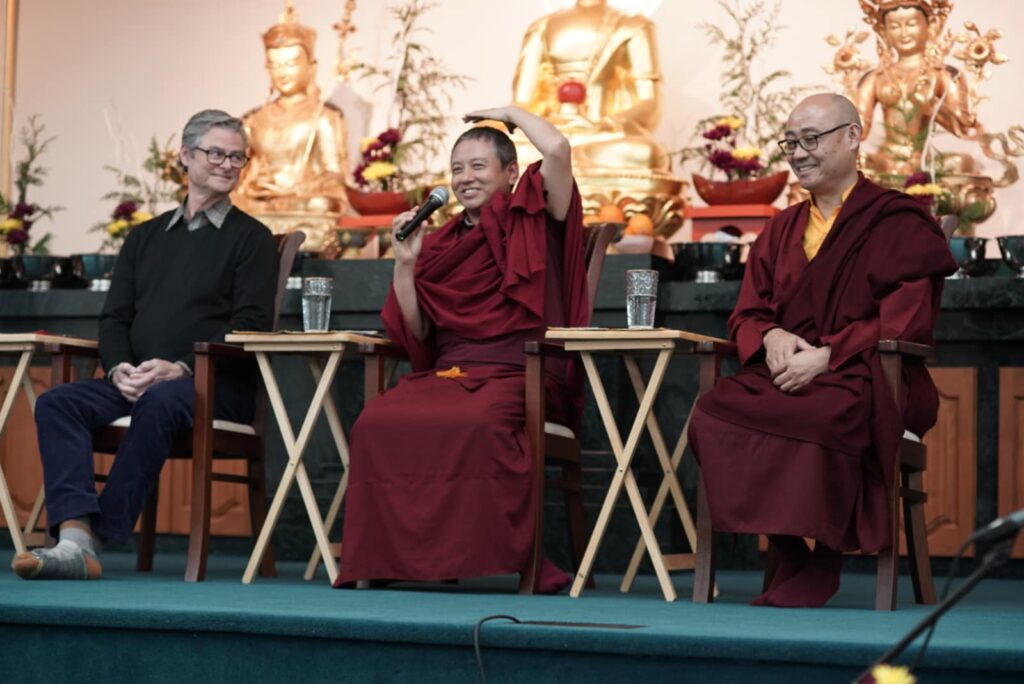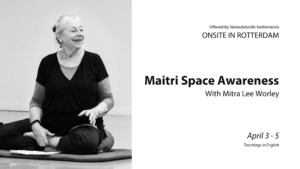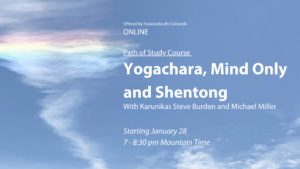Setting the Stage for a Kinder 2025: Insight from our 10th Winter Retreat
Ten years ago, initiated by Acharya Lhakpa Tshering and Nalandabodhi Connecticut, Winter Retreat was launched for the first time. This turned into an annual East Coast program, joined by Nalandabodhi New York, Philadelphia, and others. Topics included Progressive Stages of Meditation on Emptiness, the Eight Verses of Mind Trainingand :Mahāmudrā. A tradition was born.
With the Covid-19 pandemic, US & Canada East Coast centers organized, together with the Nalandabodhi supporting teams, our first online-only worldwide Winter Retreat, Waking up Our Hearts: The Condensed Meaning of the Bodhicaryavatara. In the following years, at the invitation of Acharya Lhakpa and hosted as a hybrid program from Nalanda West, Mitra Mark Power started to teach on The Thirty-Seven Practices of a Bodhisattva and a connection was made with Mind Without Borders – a prison dharma program organized by the New York City Nalandabodhi sangha.
This year, we celebrated the 10th anniversary of Nalandabodhi’s Winter Retreat, titled The Expansive Sunlight of Love and Compassion. Daily summaries of the retreat were previously shared on Nalandabodhi’s Facebook and Instagram; you can read the slightly adapted posts below.
The aspiration is to continue this tradition of yearly Winter Retreat as a great practice to pause, reflect, and deepen our connection with our path and practices, while setting aspirations for the year ahead. So, please mark your calendars and join us for our next 11th Winter Retreat at the end of 2025. We look forward to continue our hearing, contemplating and meditating on the buddhadharma, and to bring more wisdom and kindness into our world together.
Contents
- Preparing for Winter Retreat: The Expansive Sunlight Melting the Ice
- Day 1: Stepping Back and Setting the Intention (Friday, December 28, 2024)
- Day 2: Joyfully Connecting with the Path of a Bodhisattva (Saturday, December 29, 2024)
- Day 3: True Bodhisattva Activity (Sunday, December 29, 2024)
- Day 4: Joyfully Seizing the Opportunity (Monday, December 30, 2024)
- Day 5: Genuinely Dedicated to Benefit Others and Realize the Nature of Mind (Tuesday, December 31, 2024)
Preparing for Winter Retreat: The Expansive Sunlight Melting the Ice
In our busy world, we often find ourselves in “doing mode,” moving quickly and losing touch with our hearts. This can trap us in negative patterns. By pausing for a moment to let go of our usual thoughts and actions, we open ourselves to the present. This simple act can bring great benefit. When we reflect on what truly matters, we allow the expansive sunlight of our natural awareness to melt away the icy sculptures of our worries and the walls of isolation. This prepares us to step into 2025 with confidence and a renewed intention to bring love and compassion to ourselves and others.
We’ll hear Acharya Tashi Wangchuk share insights on bodhicitta and tonglen. Contemplate with Mitra Mark Power on the practices of a bodhisattva. And practice Mahāmudrā meditation under the guidance of Acharya Lhakpa Tshering. We are thankful to share this retreat with friends at Nalanda West in Seattle and those joining us online in the Zoomdhatu.
Stepping Back and Setting the Intention (Friday, December 28, 2024)
Fill in the blank: “I aspire this (retreat) will be a time of transformation, may I bring _______[write down a particular quality or idea] to this moment, and every moment.”
At the beginning of the 10th anniversary of our annual Winter Retreat, Laura kindly invited everyone to first set an intention for this retreat and then consider habits we generally seek to change in our lives. What do we need to make our actions of body, speech, and mind, transformative – for the benefit of ourselves and others?
Taking a moment to pause from our daily routines is transformative by itself. Whether you are part of the retreat or not, this time of year is a wonderful invitation for all of us to carefully consider how we are living our lives, what our deepest aspirations are, and what we can do in the year ahead to ensure we follow through, in our daily lives, upon those aspirations?
During the opening conversation with inspiring questions from Juli, Mitra Mark shared that bodhisattvas strive to alleviate all suffering through enlightenment. A great aspiration, yet far from easy to be felt and implemented in our everyday actions. Mitra Mark will continue exploring creative ways to incorporate the teachings of Ngulchu Tokmé’s Thirty-Seven Practices of a Bodhisattva into our daily lives. Acharya Tashi reminded us that it will be helpful to bring joy into this effort and to explore in the next few days how we can sustain it.
Acharya Lhakpa, who started guiding us this evening in Mahāmudrā meditation, pointed out that from the perspective of buddhadharma, there is one single purpose: realizing the nature of mind, which is also ultimate bodhicitta. Through our practice, we can learn how to adapt in every moment to whatever appears to us with fearlessness and skillfully be able to help ourselves and others.
We feel grateful for the ongoing presence and guidance of our teachers during our winter retreat and look forward to the coming days. As we step back together from time to time, may we all open our hearts and invite warmth into our interactions and today’s world through the power of love and compassion.
Joyfully Connecting with the Path of a Bodhisattva (Saturday, December 29, 2024)
“This path is the single cause for accomplishing all benefit and happiness, with none left out. It is the source of all benefit and happiness within samsara and nirvana.” – Dzatrul Ngawang Tenzin Norbu, A Guide to the Thirty-Seven Practices of a Bodhisattva, translated by Christopher Stagg.
The path this great Nyingma master, Tenzin Norbu, points to in his commentary on the great Kadampa master Ngulchu Tokmé’s text is the path of the bodhisattva.
On this second day of our Winter Retreat, Mitra Mark invited us to make a personal, intimate connection with the qualities of a bodhisattva at the physical (sensations), mental (thoughts/ideas), and emotional (feeling) levels, how the environment impacts us and how we impact the environment.
To help us get closer to the bodhisattva way, and before looking at verses 26 and 27, Mitra Mark guided us in a contemplative exercise: With your eyes closed, draw the contour of the quality of the bodhisattva path. What does that look like for you and how does that feel?
With his ever-joyful spirit, Acharya Tashi began his teachings on loving-kindness (Pali: mettā) and compassion (Sanskrit: Karuṇā). The first quality, mettā, works with happiness, whereas the second, karuṇā, addresses suffering. He emphasized that we have compassion from time to time, trying to get us out of suffering, but we lack the mettā to increase our merit and sustain our enlightened qualities. Through mindfulness, we could bring more joy and let our loving-kindness flourish.
Karunika Andrew led our morning meditation on śamatha (calm-abiding), and Karunika Carlos led a contemplative meditation in the afternoon. Acharya Lhakpa concluded the day with another session of Mahāmudrā practice.
Stressing the importance and benefit of recalling the Four Reminders, our physical posture as a firm foundation, and the possible support of a focal object, Acharya stated that the main point is to rest your mind in its own nature. Making it sound and feel simple, he said, “all we have to do is to be aware.”
True Bodhisattva Activity (Sunday, December 29, 2024)
“Then, by pure mystery, some Dharma entered through my door. I read it and it made so much sense, and it was so practical […] It was like the key that unlocked the rusty lock of my mind.”
“A lot of us don’t have many, if anyone at all, to talk to. So having someone to correspond with, even just through the path, is uplifting. People who genuinely care are hard to come by.”
These are two passages from letters that Isabel Kirsch, co-director of Mind Without Borders, read for us during this third day of our Winter Retreat. Mitra Mark, who shortly before Isabel’s presentation continued his teaching on the 37 practices of a bodhisattva, called Nalandabodhi’s Prison Program a true bodhisattva activity and everyone involved real bodhisattvas.
Revenue from our Winter Retreat will be donated to Mind Without Borders. Even more importantly, everyone is welcome to volunteer and become a penpal or make a donation to support the program’s needs. You can learn more and get involved here.
Isabel’s presentation brought the topic of our Winter Retreat even closer to our own lives. One could say it highlighted the urgency of putting the things we learn into action to benefit all others in our society.
One way to think about our meditation practices and teachings during this Winter Retreat is that we intentionally work on cultivating positive qualities. We do so through befriending our attention and strengthening our mindfulness in a relaxed manner, as Mitra Mark taught. We do so, Achara Tashi shared, by letting go of our clinging and old negative habits that keep our enlightened potential from working fully, or at all. We do so by simply being aware and open to the present moment, Acharya Lhakpa pointed out, with a sense of relaxation.
Practicing in this way we can unlock our mind and strengthen the qualities of wisdom, loving-kindness and compassion.
Winter Retreat is in honor of Mind Without Borders and this prison dharma program organized by the Nalandabodhi New York City sangha is a reminder of something Dzogchen Ponlop Rinpoche emphasizes: We all have a responsibility to share the Buddhadharma and genuinely care for those in greatest need.
Joyfully Seizing the Opportunity (Monday, December 30, 2024)
How to apply the practice of Mahāmudrā meditation to the moving mind in our everyday activities?
At the beginning of the evening session, Acharya Lhakpa recollected something Dzogchen Ponlop Rinpoche once taught in response to a similar question: Rinpoche pointed out that our mind is always with us – 24/7. Since that is the case, we always have an opportunity to tame and train our minds. The question is, how to seize that opportunity in every moment, whether at work or in any other activity and environment, using skilful means?
In response to the question, Acharya also shared a Mahāmudrā instruction from Rechungpa, which Acharya roughly translated as: “How to enhance the path? Do not reject appearances. Do not abandon skillful means. Do not forget compassion.” So, with compassion as the foundation, we can skillfully apply our practice in every situation.
This closely relates to what Mitra Mark and Acharya Tashi taught earlier the same day.
Continuing his commentary on the 37 practices of a bodhisattva, Mitra Mark noted that we need to bring joyful diligence to being aware of the state of our mind in this moment. How do we feel? What is our mind doing? The art, then, is to know when the mind is confused and how to transform that confusion into beneficial action. We will inevitably encounter difficulties on our path. However, by cultivating mindfulness and attentiveness – without which there is no path – together with compassion as our foundation, we can discern with wisdom what is beneficial.
Acharya Tashi also acknowledged that practice may not always be easy. When we feel it is difficult, we can remind ourselves that we are at the beginning of our journey – the ground. “We can try as much as we can. It’s not like we have to be perfect,” he said. If we can’t apply the teachings in a particular moment, we can still set an aspiration for the future: “May I be able to do this later, in this life or the next.”
Concluding his teaching, Acharya Tashi said it was really wonderful to begin our new year with loving-kindness and compassion and concluded with the wish for 2025: Happy metta and karuna!
Genuinely Dedicated to Benefiting Others and Realizing the Nature of Mind (Tuesday, December 31, 2024)
With deep gratitude to our teachers, Acharya Lhakpa Tshering, Acharya Tashi Wangchuk, and Mitra Mark Power, volunteers, and those joining us onsite at Nalanda West and online, sanghas at our centers and everyone from around the world, we concluded this 10th Annual Winter Retreat and 2024.
In this new year, 2025, may we continue to be creative and make the path of the bodhisattva personal and possible, as Mitra Mark always encourages us to do. Inspired by Acharya Tashi’s teachings and joyful spirit, may we show the magic of loving-kindness and compassion and connect with our enlightened qualities. Always reminding us of the heart of the Buddha’s teaching and being a guide through his presence, Acharya Lhakpa gave us advice on how to make progress on the path and change the world from within.
The last three retreats centered around the practices of a bodhisattva as taught by Ngulchu Tokmé in The Thirty-Seven Practices of a Bodhisattva. While reminding us that each single verse could be explored deeper, Mitra Mark offered his personal explanation and guided us in hearing, contemplating, and making ourselves familiar with the thirty-seventh practice of a bodhisattva: dedication.
“As to these virtues, accomplished through diligence:
To dedicate them to enlightenment with the wisdom free of the three spheres
In order to clear away the suffering
Of limitless beings is the practice of a bodhisattva.” (37)
Quoting Dzatrul Ngawang Tenzin Norbu’s explanation in A Guide to the Thirty-Seven Practices of a Bodhisattva as translated by Christopher Stagg, Mitra Mark read: “Whatever roots of virtue one has accumulated, the result will be obtained accordingly by whomever you dedicate it to.”
Kindly inviting us again to reflect and notice what this practice is like for us in body, mind, emotional realm and in connection to the environment, Mitra Mark pointed out that we know when what we have in mind is genuine. Knowing there is a basis in scripture, reasoning, and our experience, we dedicate with the possibility that it will bring benefit.
May this Winter Retreat benefit you and, ultimately, may all beings realize the nature of mind.
Happy 2025!






